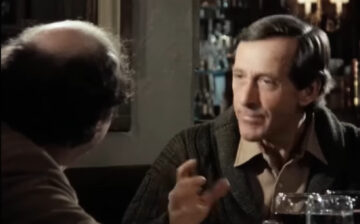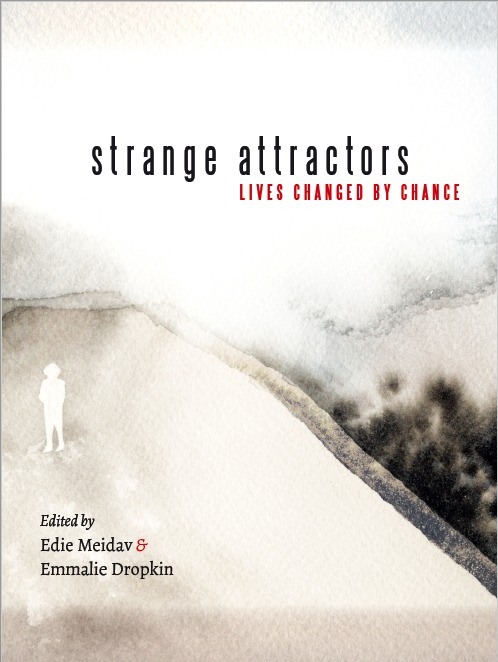by Mark R. DeLong
1.

Roger Ebert labeled it the one movie “entirely devoid of clichés.” “It should be unwatchable,” he said, “and yet those who love it return time and again, enchanted.” It was My Dinner with André, which I watched with my wife and a couple of friends at the Carolina Theatre in Durham, North Carolina, back in 1981 when the movie was released. Years later, I picked up a used VHS of the film and baffled my children with it.
One scene struck me from the first viewing, and my memory has returned to it especially in recent months. Toward the end of their dinner, Wally (Wallace Shawn) and André (André Gregory) discuss matters of preserving culture—or perhaps, more accurately, André steers the conversation through his wild and impossible adventures in new age-y communities, recounting events that would defy the laws of physics or at least stretch our imaginations.1For instance, a community, “Findhorn,” that built “a hall of meditation” seating hundreds of people with a “roof that would stay on the building and yet at the same time be able to fly up at night to meet the flying saucers.” Findhorn actually exists, though the architecture that André describes was fanciful, to say the least. The fascination with flying saucers was real, though, in the 1960s, when a leader of the Findhorn community felt that extraterrestrials could be contacted via telepathy and the community built a landing strip for the saucers.
One of the leaders of such a group, André says, was “Gustav Björnstrand”—a fictional character, not a real “Swedish physicist” as André claims—who is trying to create
a new kind of school or a new kind of monastery … islands of safety where history can be remembered and the human being can continue to function, in order to maintain the species through a Dark Age. In other words, we’re talking about an underground, which did exist during the Dark Ages in a different way, among the mystical orders of the church. And the purpose of this underground is to find out how to preserve the light, life, the culture. How to keep things living.
Wally listens, entranced but not convinced that André’s unhinged stories make sense. He’s “just trying to survive,” he says, and takes pleasure in small comforts: dinner with his girlfriend, reading Charlton Heston’s autobiography, sleeping under a warm electric blanket on cold New York nights. “Even if I did feel the way you do—you know, that there’s no possibility for happiness now,” an exasperated Wally replies to André, “then, frankly, I still couldn’t accept the idea that the way to make life wonderful would be to totally reject Western civilization and to fall back to a kind of belief in some kind of weird something.” Read more »
Footnotes
- 1For instance, a community, “Findhorn,” that built “a hall of meditation” seating hundreds of people with a “roof that would stay on the building and yet at the same time be able to fly up at night to meet the flying saucers.” Findhorn actually exists, though the architecture that André describes was fanciful, to say the least. The fascination with flying saucers was real, though, in the 1960s, when a leader of the Findhorn community felt that extraterrestrials could be contacted via telepathy and the community built a landing strip for the saucers.

 In November 2023, in an essay for the German national newspaper die taz, I wrote that Germany’s Jews were once again afraid for their lives. It was—and is—a shameful state of affairs, considering that the country has invested heavily in coming to terms with its fascist past and has made anti-antisemitism and the unconditional support of Israel part of its “Staatsräson,” or national interest—or, as others have come to define it, the reason for the country’s very existence. The Jews I’m referring to here, however, were not reacting to a widely deplored lack of empathy following the brutal attacks of October 7. In an open letter initiated by award-winning American journalist Ben Mauk and others, more than 100 Jewish writers, journalists, scientists, and artists living in Germany described a political climate where any form of compassion with Palestinian civilians was (and continues to be) equated with support for Hamas and criminalized. Assaults on the democratic right to dissent in peaceful demonstrations; cancellations of publications, fellowships, professorships, and awards; police brutality against the country’s immigrant population, liberal-minded Jews, and other protesting citizens—the effects have been widely documented, but what matters most now is now: the fact that the German press is still, four months later, nearly monovocal in its support of Israel and that over 28,000 civilians, two-thirds of them women and children, have died.
In November 2023, in an essay for the German national newspaper die taz, I wrote that Germany’s Jews were once again afraid for their lives. It was—and is—a shameful state of affairs, considering that the country has invested heavily in coming to terms with its fascist past and has made anti-antisemitism and the unconditional support of Israel part of its “Staatsräson,” or national interest—or, as others have come to define it, the reason for the country’s very existence. The Jews I’m referring to here, however, were not reacting to a widely deplored lack of empathy following the brutal attacks of October 7. In an open letter initiated by award-winning American journalist Ben Mauk and others, more than 100 Jewish writers, journalists, scientists, and artists living in Germany described a political climate where any form of compassion with Palestinian civilians was (and continues to be) equated with support for Hamas and criminalized. Assaults on the democratic right to dissent in peaceful demonstrations; cancellations of publications, fellowships, professorships, and awards; police brutality against the country’s immigrant population, liberal-minded Jews, and other protesting citizens—the effects have been widely documented, but what matters most now is now: the fact that the German press is still, four months later, nearly monovocal in its support of Israel and that over 28,000 civilians, two-thirds of them women and children, have died.  A.S.: Liesl, I love the part in your story where a pack of kids is playing “Murder in the Dark” and the young narrator’s crush, who plays the part of the killer, draws near her in the dark yard: “I didn’t try to back away, I thought maybe he was going to kiss me, but then he killed me which was so predictable.”
A.S.: Liesl, I love the part in your story where a pack of kids is playing “Murder in the Dark” and the young narrator’s crush, who plays the part of the killer, draws near her in the dark yard: “I didn’t try to back away, I thought maybe he was going to kiss me, but then he killed me which was so predictable.”